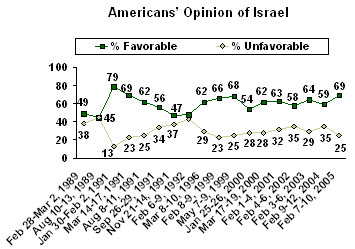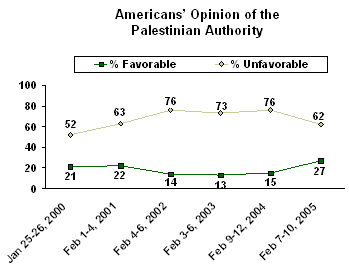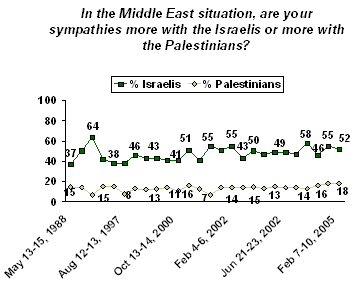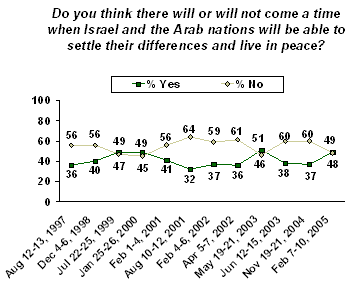GALLUP NEWS SERVICE
PRINCETON, NJ -- The informal truce between the Israelis and Palestinians announced last week may have encouraged Americans to be more optimistic about the situation in the Middle East. A new Gallup Poll finds Americans rating both sides in the dispute more positively -- including the most positive rating ever for the Palestinian Authority. However, by an overwhelming margin, Americans continue to say their sympathies lie with the Israelis. And while Americans are divided as to whether Israel and Arab nations will ever be able to settle their differences, Americans are about as positive as they have ever been on this issue.
The poll was conducted Feb. 7-10, during a Mideast summit at which Israeli Prime Minister Ariel Sharon and recently elected Palestinian Authority President Mahmoud Abbas announced a cease-fire.
Sixty-nine percent of Americans say they have a favorable opinion of Israel, the highest since May 1999 when it was at 68%. Twenty-five percent of Americans view Israel unfavorably. The only time the public's opinion of Israel was more positive was in late January and early February 1991, during the Persian Gulf War, when 79% of Americans expressed positive views of Israel.

Conversely, 27% of Americans have a favorable opinion of the Palestinian Authority -- the highest Gallup has recorded since it began measuring this item in 2000. The overall opinion is still decidedly negative, however, with 62% saying they view the Palestinian Authority unfavorably. This is the first rating of the Palestinian Authority since its long-time leader Yasser Arafat died in November 2004.

Despite the more positive views of both sides, Americans' sympathies in the conflict are basically unchanged since last year. Fifty-two percent of Americans say their sympathies lie with the Israelis in the dispute, while 18% say their sympathies lie with the Palestinians, with the remaining 30% not taking sides or offering no opinion. Last year, 55% sympathized with the Israelis and 18% with the Palestinians.
Currently, the level of sympathy for the Palestinians is at its high-water mark. Sympathy toward Israel was at its highest in February 1991, during the height of the Persian Gulf War, when 64% said they sympathized with Israel. However, Americans have always shown very strong support for Israel since this question was first asked in 1988, with margins in favor of the Israelis no less than 2 to 1, and typically higher.

The poll picked up some increasing optimism among Americans that a resolution to the Israeli-Palestinian conflict could be found, as 49% now say there will come a time when the Israelis and Arab nations will "be able to settle their differences and live in peace." That is more positive than a reading from as recently as November 2004 -- shortly after Arafat's death -- when 37% of Americans were optimistic and 60% were pessimistic about peace prospects between the two sides.
Still, the level of optimism about peace in the Middle East has a history of change. In May 2003 (shortly after President Bush declared an end to major combat operations in the war in Iraq) 51% of Americans said there would come a time of peace in the Middle East. Gallup also measured 49% optimism in July 1999 and January 2000, although that level of optimism had fallen to 32% by August 2001.

Survey Methods
These results are based on telephone interviews with a randomly selected national sample of 1,008 adults, aged 18 and older, conducted Feb. 7-10, 2005. For results based on this sample, one can say with 95% confidence that the maximum error attributable to sampling and other random effects is ±3 percentage points. In addition to sampling error, question wording and practical difficulties in conducting surveys can introduce error or bias into the findings of public opinion polls.
26. Next, I'd like your overall opinion of some foreign countries. First, is your overall opinion of [RANDOM ORDER] very favorable, mostly favorable, mostly unfavorable, or very unfavorable? How about -- [INSERT NEXT ITEM]?
M. Israel
|
Very |
Mostly favorable |
Mostly unfavorable |
Very unfavorable |
No |
Total |
Total unfavorable |
|||
|
% |
% |
% |
% |
% |
% |
% |
|||
|
2005 Feb 7-10 |
19 |
50 |
20 |
5 |
6 |
69 |
25 |
||
|
2004 Feb 9-12 |
14 |
45 |
25 |
10 |
6 |
59 |
35 |
||
|
2003 Feb 3-6 |
22 |
42 |
23 |
6 |
7 |
64 |
29 |
||
|
2002 Feb 4-6 |
16 |
42 |
25 |
10 |
7 |
58 |
35 |
||
|
2001 Feb 1-4 ^ |
18 |
45 |
20 |
12 |
5 |
63 |
32 |
||
|
2000 Mar 17-19 |
16 |
46 |
20 |
8 |
10 |
62 |
28 |
||
|
2000 Jan 25-26 |
11 |
43 |
21 |
7 |
18 |
54 |
28 |
||
|
1999 May 7-9 |
15 |
53 |
19 |
6 |
7 |
68 |
25 |
||
|
1999 Feb 8-9 |
18 |
48 |
16 |
7 |
11 |
66 |
23 |
||
|
1996 Mar 8-10 |
17 |
45 |
18 |
11 |
9 |
62 |
29 |
||
|
1992 Feb 6-9 |
12 |
36 |
27 |
16 |
9 |
48 |
43 |
||
|
1991 Nov 21-14 |
11 |
36 |
26 |
11 |
16 |
47 |
37 |
||
|
1991 Sep 26-29 |
11 |
45 |
25 |
9 |
10 |
56 |
34 |
||
|
1991 Aug 8-11 |
15 |
47 |
19 |
6 |
12 |
62 |
25 |
||
|
1991 Mar 14-17 |
20 |
49 |
16 |
7 |
8 |
69 |
23 |
||
|
1991 Jan 30-Feb 2 |
28 |
51 |
10 |
3 |
8 |
79 |
13 |
||
|
1989 Aug 10-13 |
11 |
34 |
29 |
16 |
10 |
45 |
45 |
||
|
1989 Feb 28-Mar 2 |
8 |
41 |
25 |
13 |
13 |
49 |
38 |
||
|
^ Asked of half sample |
|||||||||
W. The Palestinian Authority
|
Very |
Mostly favorable |
Mostly unfavorable |
Very unfavorable |
No |
Total favorable |
Total unfavorable |
|
|
% |
% |
% |
% |
% |
% |
% |
|
|
2005 Feb 7-10 |
3 |
24 |
43 |
19 |
11 |
27 |
62 |
|
2004 Feb 9-12 |
2 |
13 |
44 |
32 |
9 |
15 |
76 |
|
2003 Feb 3-6 |
1 |
12 |
44 |
29 |
14 |
13 |
73 |
|
2002 Feb 4-6 |
3 |
11 |
44 |
32 |
10 |
14 |
76 |
|
2001 Feb 1-4 ^ |
4 |
18 |
39 |
24 |
15 |
22 |
63 |
|
2000 Jan 25-26 |
3 |
18 |
36 |
16 |
27 |
21 |
52 |
|
^ Asked of a half sample |
|||||||
30. In the Middle East situation, are your sympathies more with the Israelis or more with the Palestinians?
|
Israelis |
Palestinians |
BOTH (vol.) |
NEITHER |
No |
|
|
% |
% |
% |
% |
% |
|
|
2005 Feb 7-10 |
52 |
18 |
7 |
12 |
11 |
|
2004 Feb 9-12 |
55 |
18 |
7 |
12 |
8 |
|
2003 May 19-21 |
46 |
16 |
12 |
14 |
12 |
|
2003 Feb 3-6 |
58 |
13 |
6 |
11 |
12 |
|
2002 Sep 2-4 |
47 |
14 |
6 |
19 |
14 |
|
2002 Jun 21-23 |
49 |
14 |
8 |
19 |
10 |
|
2002 May 20-22 |
49 |
15 |
7 |
19 |
10 |
|
2002 Apr 22-24 |
47 |
13 |
9 |
18 |
13 |
|
2002 Apr 5-7 |
50 |
15 |
9 |
17 |
9 |
|
2002 Mar 8-9 |
43 |
14 |
6 |
20 |
17 |
|
2002 Feb 4-6 |
55 |
14 |
6 |
14 |
11 |
|
2001 Dec 14-16 |
51 |
14 |
5 |
17 |
13 |
|
2001 Sep 14-15 |
55 |
7 |
4 |
20 |
14 |
|
2001 Aug 10-12 |
41 |
13 |
7 |
18 |
21 |
|
2001 Feb 1-4 |
51 |
16 |
7 |
14 |
12 |
|
2000 Oct 13-14 ^ |
41 |
11 |
9 |
18 |
21 |
|
2000 Jul 6-9 |
41 |
14 |
5 |
18 |
22 |
|
2000 Jan 25-26 |
43 |
13 |
5 |
21 |
18 |
|
1999 Jul 22-25 |
43 |
12 |
11 |
19 |
15 |
|
1998 Dec 4-6 |
46 |
13 |
5 |
22 |
14 |
|
1997 Aug 12-13 |
38 |
8 |
5 |
19 |
30 |
|
1996 Nov 21-24 |
38 |
15 |
6 |
14 |
27 |
|
1993 Sep 10-12 |
42 |
15 |
6 |
17 |
20 |
|
1991 Feb |
64 |
7 |
19 |
-- |
10 |
|
1989 Aug |
50 |
14 |
15 |
-- |
21 |
|
1988 May 13-15 |
37 |
15 |
22 |
-- |
27 |
|
^ Based on interviews with 821 national adults; ±4 pct. pts. |
|||||
|
(vol.) Volunteered response |
|||||
|
May 1988-April 2002 and February 3-6, 2003 WORDING: In the Middle East situation, are your sympathies more with the Israelis or more with the Palestinian Arabs? |
|||||
31. Do you think there will or will not come a time when Israel and the Arab nations will be able to settle their differences and live in peace?
|
Yes, there |
No, there |
No |
|
|
% |
% |
% |
|
|
2005 Feb 7-10 |
49 |
48 |
3 |
|
2004 Nov 19-21 |
37 |
60 |
3 |
|
2003 Jun 12-15 ^ |
38 |
60 |
2 |
|
2003 May 19-21 |
51 |
46 |
3 |
|
2002 Apr 5-7 |
36 |
61 |
3 |
|
2002 Feb 4-6 |
37 |
59 |
4 |
|
2001 Aug 10-12 |
32 |
64 |
4 |
|
2001 Feb 1-4 |
41 |
56 |
3 |
|
2000 Jan 25-26 |
49 |
45 |
6 |
|
1999 Jul 22-25 |
49 |
47 |
4 |
|
1998 Dec 4-6 |
40 |
56 |
4 |
|
1997 Aug 12-13 |
36 |
56 |
8 |
|
^ Asked of a half sample. |
|||
